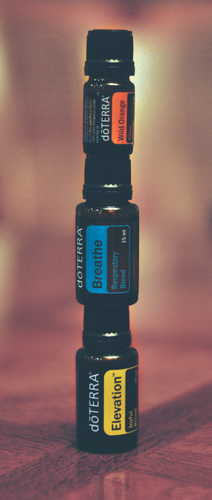
Packaged in charming little bottles and emanating soothing scents, essential oils are becoming more common in daily therapeutic use. With just a few drops, essential oils can help evoke freshness, peace, and clarity of mind. Last month, UNIT-E had the pleasure of interviewing JC Lai, the co-head of dōTERRA Essential Oils in Beijing.
UNIT-E: First of all, what exactly are essential oils?
JC Lai: Essential oils are natural aromatic compounds found in seeds, stems, roots, flowers, and other parts of the plant. They are very powerful in fragrance and element. Just smelling a certain scent of essential oil can influence your mood. Each plant has different properties that yield different results.
UNIT-E: What differentiates “essential” oils from other oils, drugs, or medicine?
JC Lai: dōTERRA is pure, safe and effective. Many perfumes, for instance, are not good for our body because the chemicals, when inhaled, stay inside the body and in the long run may create some internal harm. Also, edible oils, like vanilla extract, though made for consumption, often contain some artificial ingredients. However, dōTERRA contains completely natural ingredients. Chinese herb medicines also use purely natural elements, but the thing is, it is not as effective and has a bitter taste.
For therapeutic oils, most of them have not been tested for chemicals and so, must always be diluted when used. The difference with dōTERRA is that it is CPTG certified grade oil, which means the oils have been carefully tested out. The tests also provide accurate details on the ideal concentrations or methods of use for each essential oil, which makes it very safe to use.
Additionally, in Western medicine, doctors mainly try to cure the symptom, using medication to control it, but this usually triggers other side effects. They then try to cure the new symptom, bringing about another symptom, and the problem is not really fixed at all. However, dōTERRA targets the problem’s source and its use of purely natural ingredients help minimize side effects. For instance, my friend used to have a rash on her neck. For more than 2 months she went to many different doctors, both Chinese and Western, but nothing worked. Our essential oils teacher then recommended that she try Terrazyme, an enzyme, which is not rubbed on the skin but ingested. After 3 days of taking it, she could already feel the difference. So here, you can see that Terrazyme did not try to stop the symptom, the rash on the skin, but fixed the root of the problem.
UNIT-E: Which specific types of essential oils would you recommend for students, such as in aiding stress relief?
JC Lai: I highly recommend Lavender, as well as Serenity, which is a blend of different kinds of oils to help calm yourself and help you focus when too much is on your mind. Also, Balance, the one I use, is helpful when you are very tired, but have a lot of things on your mind. Using it before bedtime will help you sleep easier. There are also oils that can help you focus before tests, like Frankincense and the Focus Blend.
Another good essential oil to use is Elevation, which lifts you up when you feel low in energy. Smelling Citrus Bliss will also lift up your mood. Actually, Fox News did a research on this at a hospital and after installing Citrus Bliss diffusers around the building, nurses felt much happier when working there.
UNIT-E: How have essential oils expanded across Beijing during the time you have been managing business here?
JC Lai: At first, when dōTERRA became more known in Beijing, there were many different voices questioning essential oils. For instance, “how can you use the oil directly on the skin?” or “how could you drink it?” or “this can’t be safe!” But a couple years later, my son came home and told me that he heard an entire group of students discussing essential oils. It’s amazing! Each kid’s family used dōTERRA. My family now almost 99.9 percent of the time uses essential oils instead of over the counter drugs. When someone has a fever, cough, or runny nose, we use essential oils.
This article originally appeared in the October 2013 issue of UNIT-E. It was written by Rosalind Chang, a student at the International School of Beijing.
About UNIT-E
UNIT-E was founded in the spring of 2010 with the aim of establishing a non-profit, student-run magazine for international students in Beijing. Staffed by current students from a range of international schools, the magazine provides an amalgam of cultural tidbits, fragments of Beijing student life, and a broad spectrum of unique perspectives from a diverse group of young adults.



